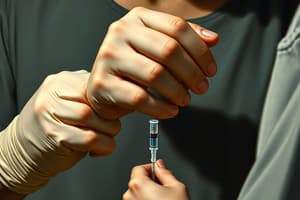Podcast
Questions and Answers
What is the primary focus of Dr. Hossein Imani's expertise?
What is the primary focus of Dr. Hossein Imani's expertise?
- Surgical Techniques
- Public Health Policy
- Clinical Nutrition (correct)
- Pharmaceutical Chemistry
Which field does Dr. Hossein Imani's work mainly involve?
Which field does Dr. Hossein Imani's work mainly involve?
- Medical Nutrition Therapy (correct)
- Radiological Imaging
- Psychiatric Medicine
- Genetic Disorders
In which context is insulin injection commonly discussed?
In which context is insulin injection commonly discussed?
- Medical Nutrition Therapy for Diabetes (correct)
- Surgical Procedures for Obesity
- Weight Management Programs
- Caloric Restriction Guidelines
What aspect of diabetes management is likely addressed by Dr. Imani?
What aspect of diabetes management is likely addressed by Dr. Imani?
What is the key component Dr. Imani would suggest to optimize diabetes management?
What is the key component Dr. Imani would suggest to optimize diabetes management?
What is the effect of combining short-acting and intermediate-acting insulin on blood sugar control?
What is the effect of combining short-acting and intermediate-acting insulin on blood sugar control?
In which location should insulin injections be administered for better absorption?
In which location should insulin injections be administered for better absorption?
Which of the following statements about insulin injections is incorrect?
Which of the following statements about insulin injections is incorrect?
What is the primary benefit of mixing different types of insulin?
What is the primary benefit of mixing different types of insulin?
Why is it important to choose the right injection site for insulin?
Why is it important to choose the right injection site for insulin?
What does the absorption rate of insulin depend on?
What does the absorption rate of insulin depend on?
Why is it recommended to avoid injecting insulin in the same area consistently?
Why is it recommended to avoid injecting insulin in the same area consistently?
How does the type of insulin affect its duration in the body?
How does the type of insulin affect its duration in the body?
What should a patient do regarding their insulin injection sites?
What should a patient do regarding their insulin injection sites?
What is a factor that influences the absorption speed of insulin?
What is a factor that influences the absorption speed of insulin?
Which injection site generally provides faster insulin absorption?
Which injection site generally provides faster insulin absorption?
What might occur if insulin is injected in the same area repeatedly?
What might occur if insulin is injected in the same area repeatedly?
How can patients enhance the effectiveness of their insulin injections?
How can patients enhance the effectiveness of their insulin injections?
What influences the effectiveness of an insulin injection?
What influences the effectiveness of an insulin injection?
Which of the following contradictions is true regarding insulin injection sites?
Which of the following contradictions is true regarding insulin injection sites?
Flashcards
Insulin Mix
Insulin Mix
Combining short-acting and intermediate-acting insulin can be more effective at managing blood sugar levels.
Injection Site
Injection Site
The location of insulin injection should have a suitable amount of fat for optimal absorption.
Short-Acting Insulin
Short-Acting Insulin
Short-acting insulin starts working quickly, but its effects don't last long.
Intermediate-Acting Insulin
Intermediate-Acting Insulin
Signup and view all the flashcards
Insulin Therapy
Insulin Therapy
Signup and view all the flashcards
What is Diabetes Mellitus?
What is Diabetes Mellitus?
Signup and view all the flashcards
What is Medical Nutrition Therapy (MNT) for Diabetes Mellitus?
What is Medical Nutrition Therapy (MNT) for Diabetes Mellitus?
Signup and view all the flashcards
What is Insulin Injection?
What is Insulin Injection?
Signup and view all the flashcards
How is Insulin Injected?
How is Insulin Injected?
Signup and view all the flashcards
How should Insulin be stored?
How should Insulin be stored?
Signup and view all the flashcards
Insulin Absorption Rate
Insulin Absorption Rate
Signup and view all the flashcards
Insulin Injection Rotation
Insulin Injection Rotation
Signup and view all the flashcards
Insulin Injection Site
Insulin Injection Site
Signup and view all the flashcards
Avoid Constant Injection Site
Avoid Constant Injection Site
Signup and view all the flashcards
What is insulin?
What is insulin?
Signup and view all the flashcards
Insulin Duration
Insulin Duration
Signup and view all the flashcards
Insulin Types
Insulin Types
Signup and view all the flashcards
Absorption Rate Comparison
Absorption Rate Comparison
Signup and view all the flashcards
Insulin Absorption
Insulin Absorption
Signup and view all the flashcards
Study Notes
Medical Nutrition Therapy for Diabetes Mellitus
- The presentation outlines medical nutrition therapy for diabetes mellitus.
- A diagram of the pancreas and its associated ducts is included.
- The presentation also touches upon the importance of medical nutrition therapy (MNT) for those with diabetes mellitus.
- Table 1 details TDD (Total Daily Dose) estimations for insulin-naive patients, associating them with different patient characteristics (underweight, older age, hemodialysis, normal weight, overweight, obese, insulin resistant, and those using corticosteroids).
Determining a TDD for Insulin-Naive Patients
-
0.3 units/kg body weight is the estimated TDD for underweight individuals and older adults, as well as those undergoing hemodialysis.
-
0.4 units/kg body weight is the estimated TDD for those who are of normal weight.
-
0.5 units/kg body weight is the estimation for those overweight.
-
0.6 or more units is the estimated TDD for obese patients and those resistant to insulin, as well as those using corticosteroids.
Insulin Injection Notes
- Mixing short-acting and intermediate-acting insulins can improve blood sugar control.
- Choose injection sites with sufficient subcutaneous fat for optimal insulin absorption.
- Insulin absorption varies depending on the injection site.
- Rotate injection sites to avoid lipohypertrophy or lipoatrophy.
- Timing of insulin injections depends on the type and duration of action.
Insulin Injection Sites
- The recommended injection sites for insulin are the thighs, arms, and abdomen. Specifically, the subcutaneous fat on the abdomen and outer thighs is optimal.
Insulin Delivery Methods
- Options include syringes, insulin pens, and insulin pumps.
Insulin Storage
- Store insulin away from extreme temperatures to maintain its effectiveness.
- Insulins may change shape, form clumps or sediment if stored incorrectly.
- Damaged insulin should be discarded immediately.
Insulin Dosage
- Two different methods (2/3, 1/3) are presented for determining insulin dosages
- A method for determining U/Kg and unit/CHO
- The calculation method of determining the initial dose is mentioned.
Incretin effect
- Incretins (e.g., GLP-1) enhance glucose-dependent insulin secretion and have other antihyperglycemic effects.
- Incretins enhance glucose-dependent insulin secretion by pancreatic beta-cells.
- Incretins suppress inappropriately elevated glucagon secretion.
- Incretins slow gastric emptying.
Modern Diabetes Treatments (Liraglutide)
- Liraglutide (Victoza) is a novel diabetes treatment.
Mechanism of Incretin Secretion
- Incretins, peptide hormones, are released into the bloodstream in response to food intake.
- GLP-1 (glucagon-like peptide-1) is an incretin secreted from the intestines that has substantial impacts on the pancreas and other organs.
Effects of Modern Diabetes Treatments (e.g., Liraglutide)
- The presentation outlines the positive effects of the treatment such as weight loss and increased feelings of satiety.
- The presentation also mentions reduced systolic blood pressure.
- Furthermore, reduced glucose production from the liver is noted.
- Increased insulin secretion dependent on glucose levels and the decreased secretion of glucagon are also highlighted.
International Guidelines for Post-Metformin Treatment Options
- The presentation contrasts various post-metformin treatment methods, highlighting differences in A1c effect, hypoglycemia risk, and impact on weight.
Dietary Supplements for Diabetic Patients
- Zinc supplements (70 mg three times daily for 3 months) are recommended for diabetic foot problems and slow wound healing.
- Vitamins B1 and B6 supplements (2 months) are recommended for diabetic neuropathy.
Different Zinc Salt Forms
- Zinc sulfate contains 23% elemental zinc.
- Zinc gluconate contains 14.3% elemental zinc.
Zinc Superloading
- Short-term zinc superloading (up to 100 mg/day for 2-4 months) is generally considered safe, but prolonged superloading is not advised due to exceeding the tolerable upper limit (TUL) of 40 mg.
Metformin and Vitamin B12 Deficiency
- Long-term metformin use may increase the risk of vitamin B12 deficiency, impacting patients' energy levels and blood count.
- It is critical to monitor vitamin B12 levels during extended metformin therapy.
Neurobion (Combination Vitamins)
- Neurobion contains B vitamins including B1, B6 and B12.
- Neurobion is indicated for nerve support, pain relief, and nerve regeneration.
- Neurobion is useful in managing diabetic neuropathy, alcoholism and spinal column degeneration.
Dietary Recommendations
- Avoid excessive heat and cold when storing insulins in the refrigerator.
- Alcohol can interfere with insulin or oral antidiabetic medication actions, potentially causing hypoglycemia (low blood sugar).
- Cinnamon use may lower blood sugar, but more studies are needed.
- General vitamin ,mineral supplements show no benefit without deficiency.
- Individualized meal planning is crucial for optimal micronutrient intake.
Sweeteners
- Sucrose intake (10% to 35% of total energy) doesn't negatively affect glycemic or lipid responses when substituting for starch.
- Large fructose intake (15%–20% of daily energy) can negatively affect plasma lipids.
- FDA-approved reduced-calorie sweeteners (sugar alcohols, hydrogenated starch, hydrolysates and tagatose) have a lower glycemic response and average 2 calories/gram.
- Sugars such as saccharin, aspartame, neotame, acesulfame potassium and sucralose do not have calories and are FDA approved.
- The acceptable daily intake (ADI) is determined by the FDA for all food additives, including non-nutritive sweeteners, it is the amount deemed safe for everyday consumption without risk.
- Saccharin, though safe for general consumption during pregnancy, might be a weak carcinogen in rats.
- Acesulfame-K is considered safe for pregnant women.
- Both saccharin and acesulfame-K cross the placenta and are found in breast milk, but they don't appear to have adverse effects on the fetus or infant.
Sugar Alcohols
- Sugar alcohols (e.g., sorbitol, mannitol, xylitol, isomalt) are naturally present in various fruits and vegetables.
- Consuming large quantities of sugar alcohols can cause gastric discomfort and diarrhea, particularly in children.
Stevia
- A natural sweetener, stevia-derived Rebaudioside A is FDA-recognized as safe and currently commercially available.
Glycemic Index (GI)
- A measurement of how rapidly a carbohydrate food increases blood sugar.
- A higher GI indicates a faster increase in blood sugar.
- Foods with a low GI can help to regulate blood sugar levels.
Glycemic Load (GL)
- A measure of the total amount of carbohydrates in a food.
- A higher GL suggests a greater effect on blood sugar.
- Taking into account portion size.
Insulin-to-Carbohydrate Ratio (ICR)
- The ratio calculated by dividing 500 by the total daily dose (TDD) of insulin.
- Helps determine how much insulin is necessary to counteract carbs consumed.
Insulin Sensitivity Factor (ISF)
-
Used to determine how much insulin lowers blood glucose levels after meals.
-
Calculated by dividing 1800 by the total daily dose (TDD) of insulin.
Meal Planning
- Carbohydrate counting emphasizes spreading consumption among the daily meals.
- A balanced distribution of carbohydrates across meals and snacks is crucial.
Weight Reduction
- Aiming for a weight reduction of 5-10 kg is beneficial for those with diabetes.
Dietary Considerations for Athletes with Diabetes
- Diabetic athletes need careful attention in their dietary planning, paying special attention to potential glucose fluctuations.
- Dietary strategies in athletes with diabetes should consider meal timing relative to the timing of exercise.
Exercise and Diabetes Management
- Exercise's timing influence on a diabetic's insulin sensitivity varies based on the type of insulin used and the duration/intensity of the exercise.
- Patients on regular insulin face a risk of delayed hypoglycemia following exercise.
- The timing of carbohydrate intake prior to or during exercise is needed.
- Blood glucose should be closely monitored during exercise for those with diabetes, particularly during strenuous activity.
Studying That Suits You
Use AI to generate personalized quizzes and flashcards to suit your learning preferences.




